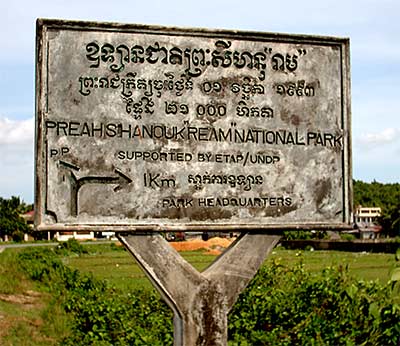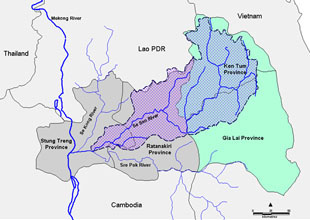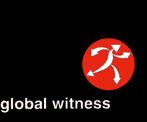2008 Green Forum Articles
National Park for Sale (17 October 2008)
Encouraging Primate News (13 September)
Hydropower Dam Studies (9 September)
Different Perceptions (2 April)
Shoot the Messenger (22 March)
Elephant Survey (29 January)
17 October 2008
Ream National Park: For Sale

From Travelfish.org, "100% original travel information for backpacking in Cambodia":
| Registered in 1995, Ream National Park has so far achieved a rare feat thanks to vigilant, apparently uncorrupt rangers. They've managed to keep most of Ream's mangroves, wildlife, and beaches in pristine condition. The park's 200 inhabitants have not been forcibly relocated but have been allowed to stay and continue their subsistence fishing lifestyle. No new residents are allowed, keeping Ream's ecosystem in reasonable balance. |
From The Cambodia Daily (1 October 2008):
| Hundreds of families are illegally buying and selling land in Sihanoukville's Ream National Park, according to Environment Ministry officials, but little is being done to stop the practice. Environment Ministry Secretary of State Yin Kim Sean said that his ministry is aware of the illegal deals, but has no firm plan to stop them. "We will stop them in the future," Yin Kim Sean said. "We already have the natural resources protection law to prevent and stop this. We will solve them one by one. How can we solve it all at once?" |
How indeed, when there is no will? Once again the venality, greed, incompetence of Cambodia officialdom surfaces for all to see.
[Photo from Sihanoukville-Cambodia.com]
13 September 2008
 A recent survey conducted in Cambodia by the Wildlife Conservation Society found surprisingly large concentrations of two endangered primates. This follows by a month an earlier report that said that primates were more endangered in Cambodia by deforestation, illegal logging, and hunting that in any other place in the world. Nine out of ten primate species in Cambodia are classified as endangered.
A recent survey conducted in Cambodia by the Wildlife Conservation Society found surprisingly large concentrations of two endangered primates. This follows by a month an earlier report that said that primates were more endangered in Cambodia by deforestation, illegal logging, and hunting that in any other place in the world. Nine out of ten primate species in Cambodia are classified as endangered.
The WCU report reported larger than expected concentrations of black-shanked douc langurs, a monkey, and yellow-cheeked gibbons, an ape species, and said these are the largest populations of these species in the world. The WCU gave credit to the Cambodian government for the extensive survey made over six months and said that it showed that Forestry Administration practices are beginning to protect some species. [Yellow-cheeked gibbons photo from Wikipedia]
9 September 2008
Hydropower Dams

A Chinese company has received permission from the Cambodian government to study the feasibility of two hydropower dams on the Sre Pok River in northeast Cambodia. Community-focused NGOs have called on the government to give more information about the project, known so far only through newspaper and media accounts. Such projects are a legitimate cause for worry in Cambodia where proper regulations for studies and impact statements are ignored. References in The Cambodia Daily's article about the agreement give more reason for concern:
- Confronted with possible negative consequences on the Sre Pok, Mekong, and Seasan rivers, the Minister of Industry, Mines, and Energy said: " 'We have already thought about this,' declining to elaborate."
- The Chinese firm involved has "been criticized by NGOs for paying scant regard to international best practices for such developments."
- The governor of Ratanakiri Province where the dams would be built said "that he was unaware of any plans for dams on the Sre Pok in his province."
2 April 2008
Different Perceptions
In February, 2008, the Cambodia government expelled Global Witness, an environmental monitoring group, for their work in protecting Cambodia's forests--which Global Witness said were being exploited by Cambodian officials. In February, 2008, the U.S. government passed a law to deny visas to enter the United States to Cambodian officials implicated in plundering Cambodia's forests in a 2007 Global Witness report. The new legislation requires the U.S. State Department to identify officials and their relatives who are suspected of involvement "in corruption relating to the extraction of natural resources in their countries." A subcommittee recommendation speaks specifically to the Cambodian scene, requiring the government "to prohibit corrupt Cambodian officials identified in the June 2007 Global Witness report--from entering the United States."
22 March 2008
Shoot the Messenger
 The environmental watchdog group called Global Witness received an award in February from Foreign Policy Magazine and the Center for Global Development for its work in protecting the environment by investigating corruption and wrongdoing in regard to environmental policy. What reward did Global Witness get from the government in Cambodia where it began work in 1993? The government of Cambodia threw them out of the country because the produced a report called "Cambodia's Family Tree" which alleged extensive involvement of the government and military in illegal logging. So much for honesty and transparency....
The environmental watchdog group called Global Witness received an award in February from Foreign Policy Magazine and the Center for Global Development for its work in protecting the environment by investigating corruption and wrongdoing in regard to environmental policy. What reward did Global Witness get from the government in Cambodia where it began work in 1993? The government of Cambodia threw them out of the country because the produced a report called "Cambodia's Family Tree" which alleged extensive involvement of the government and military in illegal logging. So much for honesty and transparency....
29 January 2008
Elephant Survey
 According to the Cambodian Elephant Conservation Group, " for wild elephant populations, Cambodia is one of the last outposts in Southeast Asia." The group is now involved in surveying the elephant herds of the kingdom by collecting dung samples which are analyzed for information. Some 520 samples of elephant droppings in Cambodia were collected over four months and then sent to Australia for DNA analysis which will provide information about the numbers of individual elephants plus data about their sexes, ages, and family and herd structures and how they are related to each other. The sampling, done in Cambodia's Cardamom Mountains, home to an estimated 200-500 wild elephants, is the largest endeavor of its type ever attempted. The information about the elephants will be used to track the movements of the herds (each dung sample was marked with GPS coordinates), establish protected areas, and perhaps to encourage eco-tourism. [Photo from US Embassy, Phnom Penh]
According to the Cambodian Elephant Conservation Group, " for wild elephant populations, Cambodia is one of the last outposts in Southeast Asia." The group is now involved in surveying the elephant herds of the kingdom by collecting dung samples which are analyzed for information. Some 520 samples of elephant droppings in Cambodia were collected over four months and then sent to Australia for DNA analysis which will provide information about the numbers of individual elephants plus data about their sexes, ages, and family and herd structures and how they are related to each other. The sampling, done in Cambodia's Cardamom Mountains, home to an estimated 200-500 wild elephants, is the largest endeavor of its type ever attempted. The information about the elephants will be used to track the movements of the herds (each dung sample was marked with GPS coordinates), establish protected areas, and perhaps to encourage eco-tourism. [Photo from US Embassy, Phnom Penh]
 A recent survey conducted in Cambodia by the Wildlife Conservation Society found surprisingly large concentrations of two endangered primates. This follows by a month an earlier report that said that primates were more endangered in Cambodia by deforestation, illegal logging, and hunting that in any other place in the world. Nine out of ten primate species in Cambodia are classified as endangered.
A recent survey conducted in Cambodia by the Wildlife Conservation Society found surprisingly large concentrations of two endangered primates. This follows by a month an earlier report that said that primates were more endangered in Cambodia by deforestation, illegal logging, and hunting that in any other place in the world. Nine out of ten primate species in Cambodia are classified as endangered.

 The environmental watchdog group called Global Witness received an award in February from Foreign Policy Magazine and the Center for Global Development for its work in protecting the environment by investigating corruption and wrongdoing in regard to environmental policy. What reward did Global Witness get from the government in Cambodia where it began work in 1993? The government of Cambodia threw them out of the country because the produced a report called "Cambodia's Family Tree" which alleged extensive involvement of the government and military in illegal logging. So much for honesty and transparency....
The environmental watchdog group called Global Witness received an award in February from Foreign Policy Magazine and the Center for Global Development for its work in protecting the environment by investigating corruption and wrongdoing in regard to environmental policy. What reward did Global Witness get from the government in Cambodia where it began work in 1993? The government of Cambodia threw them out of the country because the produced a report called "Cambodia's Family Tree" which alleged extensive involvement of the government and military in illegal logging. So much for honesty and transparency....
 According to the Cambodian Elephant Conservation Group, " for wild elephant populations, Cambodia is one of the last outposts in Southeast Asia." The group is now involved in surveying the elephant herds of the kingdom by collecting dung samples which are analyzed for information. Some 520 samples of elephant droppings in Cambodia were collected over four months and then sent to Australia for DNA analysis which will provide information about the numbers of individual elephants plus data about their sexes, ages, and family and herd structures and how they are related to each other. The sampling, done in Cambodia's Cardamom Mountains, home to an estimated 200-500 wild elephants, is the largest endeavor of its type ever attempted. The information about the elephants will be used to track the movements of the herds (each dung sample was marked with GPS coordinates), establish protected areas, and perhaps to encourage eco-tourism. [Photo from US Embassy, Phnom Penh]
According to the Cambodian Elephant Conservation Group, " for wild elephant populations, Cambodia is one of the last outposts in Southeast Asia." The group is now involved in surveying the elephant herds of the kingdom by collecting dung samples which are analyzed for information. Some 520 samples of elephant droppings in Cambodia were collected over four months and then sent to Australia for DNA analysis which will provide information about the numbers of individual elephants plus data about their sexes, ages, and family and herd structures and how they are related to each other. The sampling, done in Cambodia's Cardamom Mountains, home to an estimated 200-500 wild elephants, is the largest endeavor of its type ever attempted. The information about the elephants will be used to track the movements of the herds (each dung sample was marked with GPS coordinates), establish protected areas, and perhaps to encourage eco-tourism. [Photo from US Embassy, Phnom Penh]